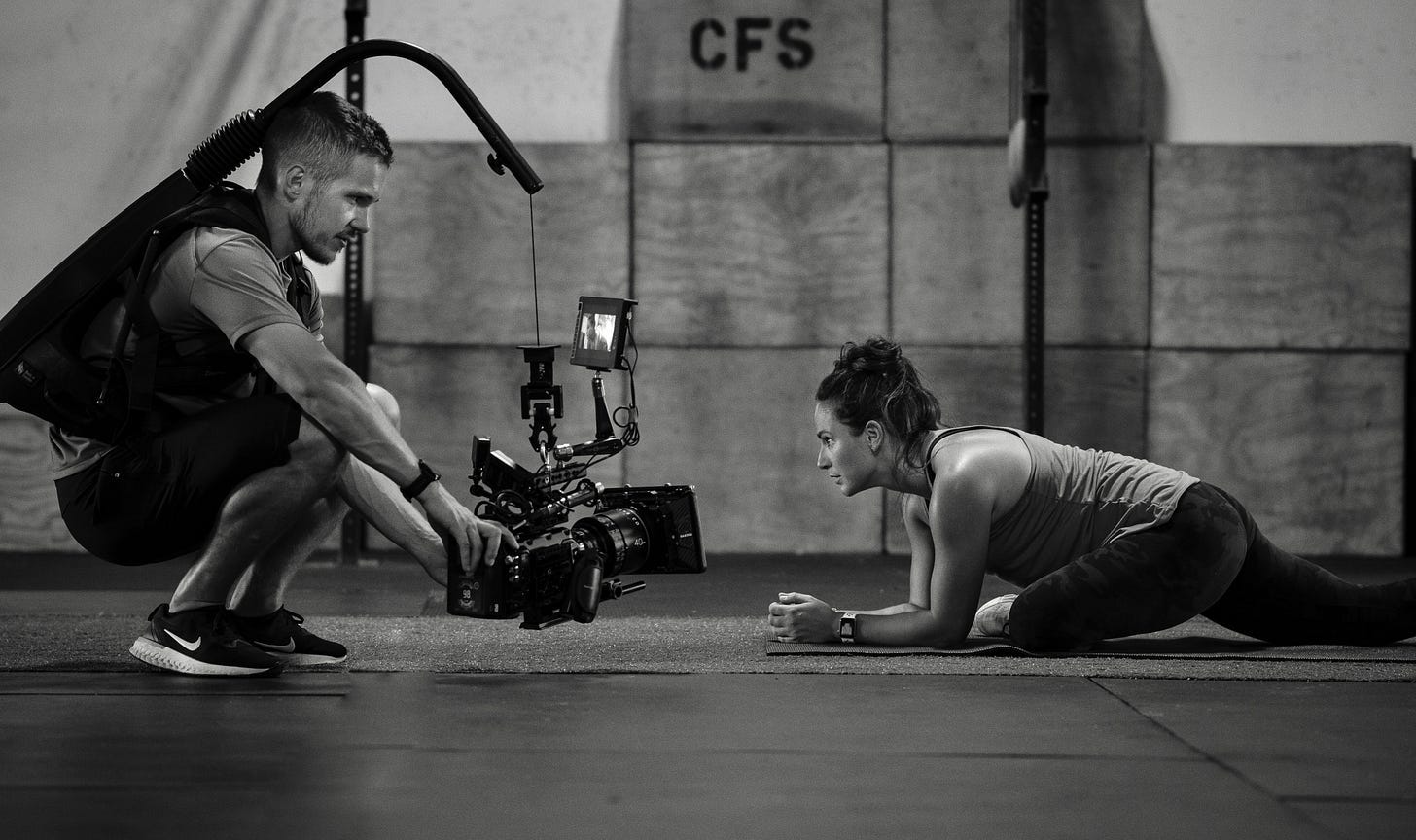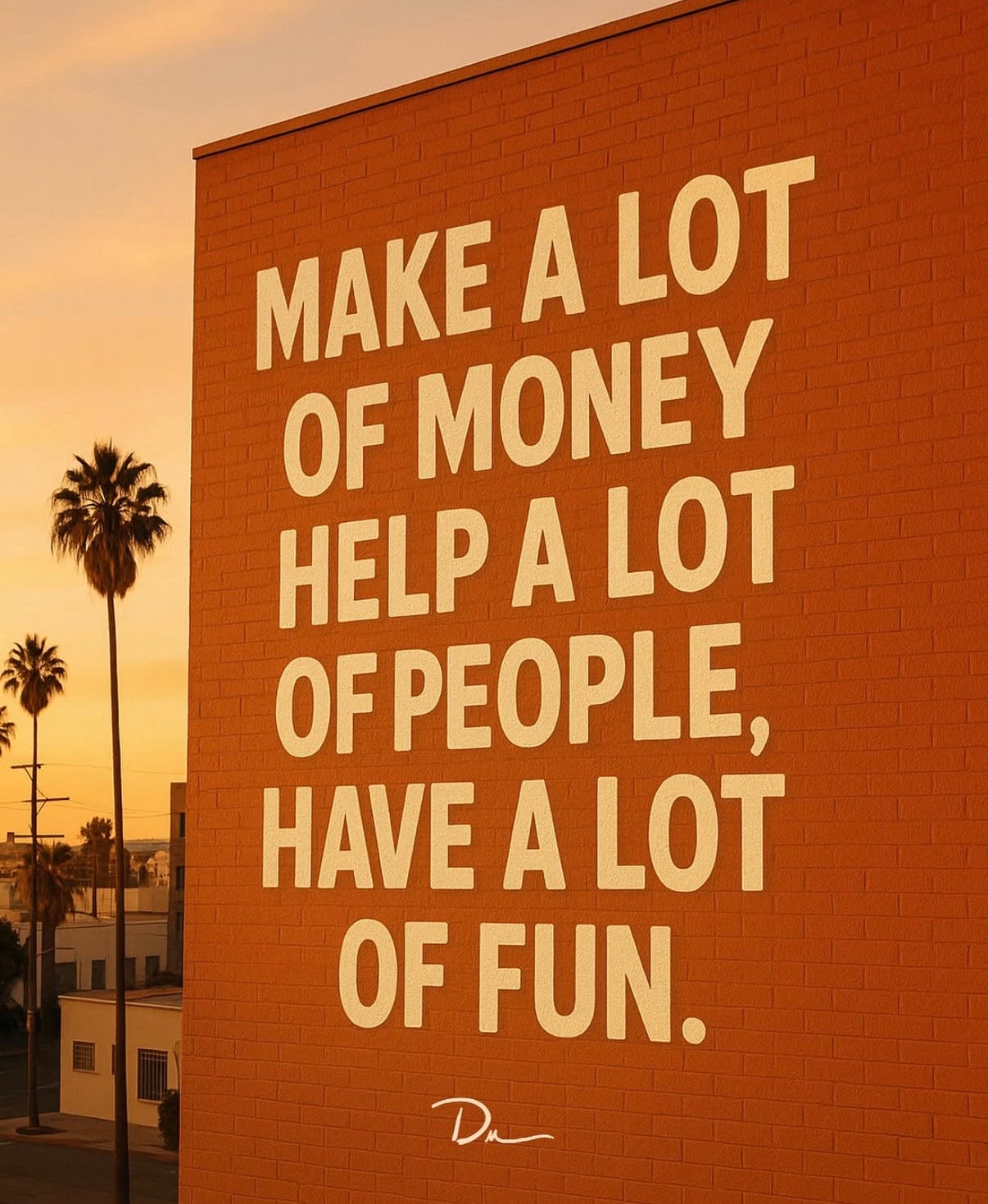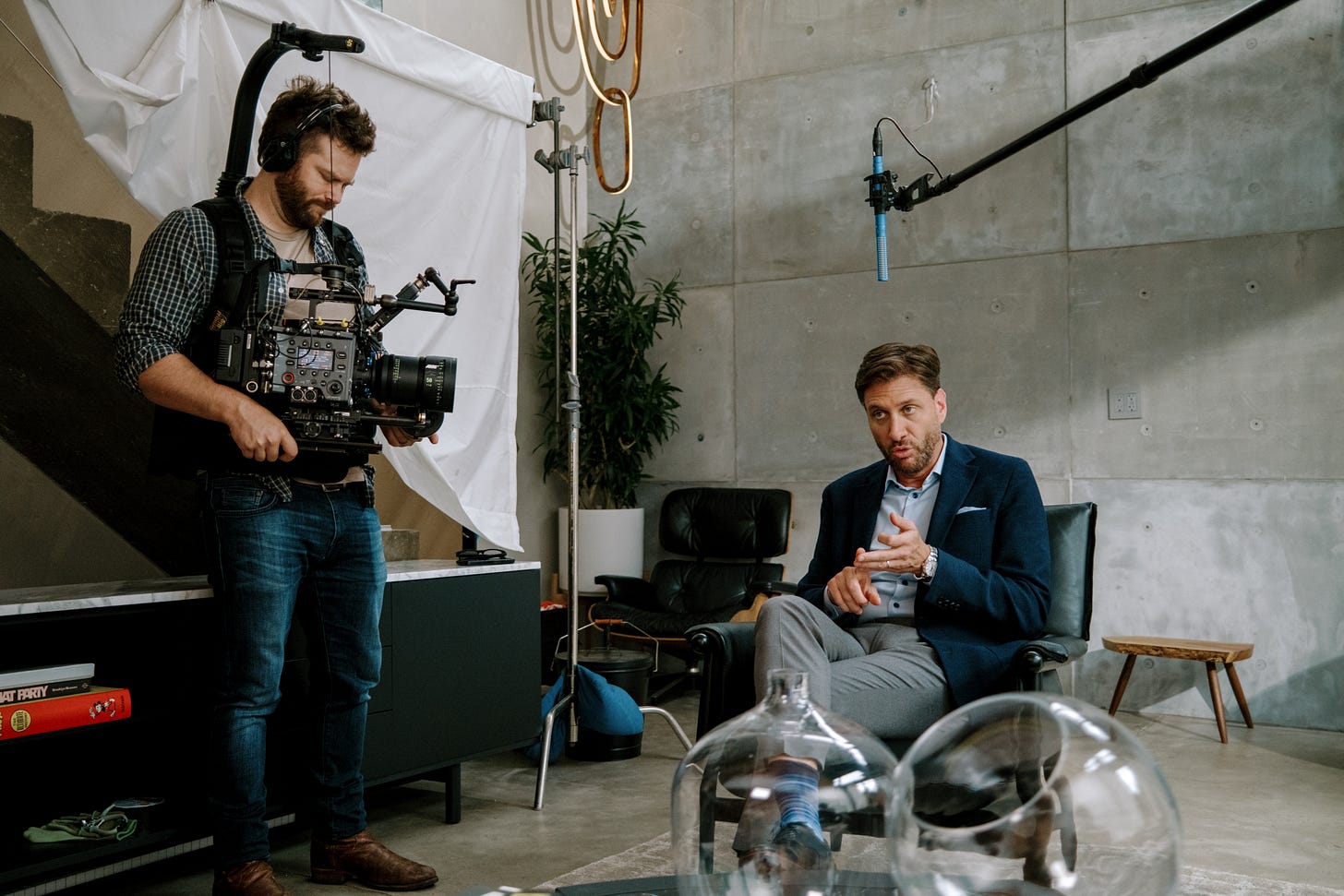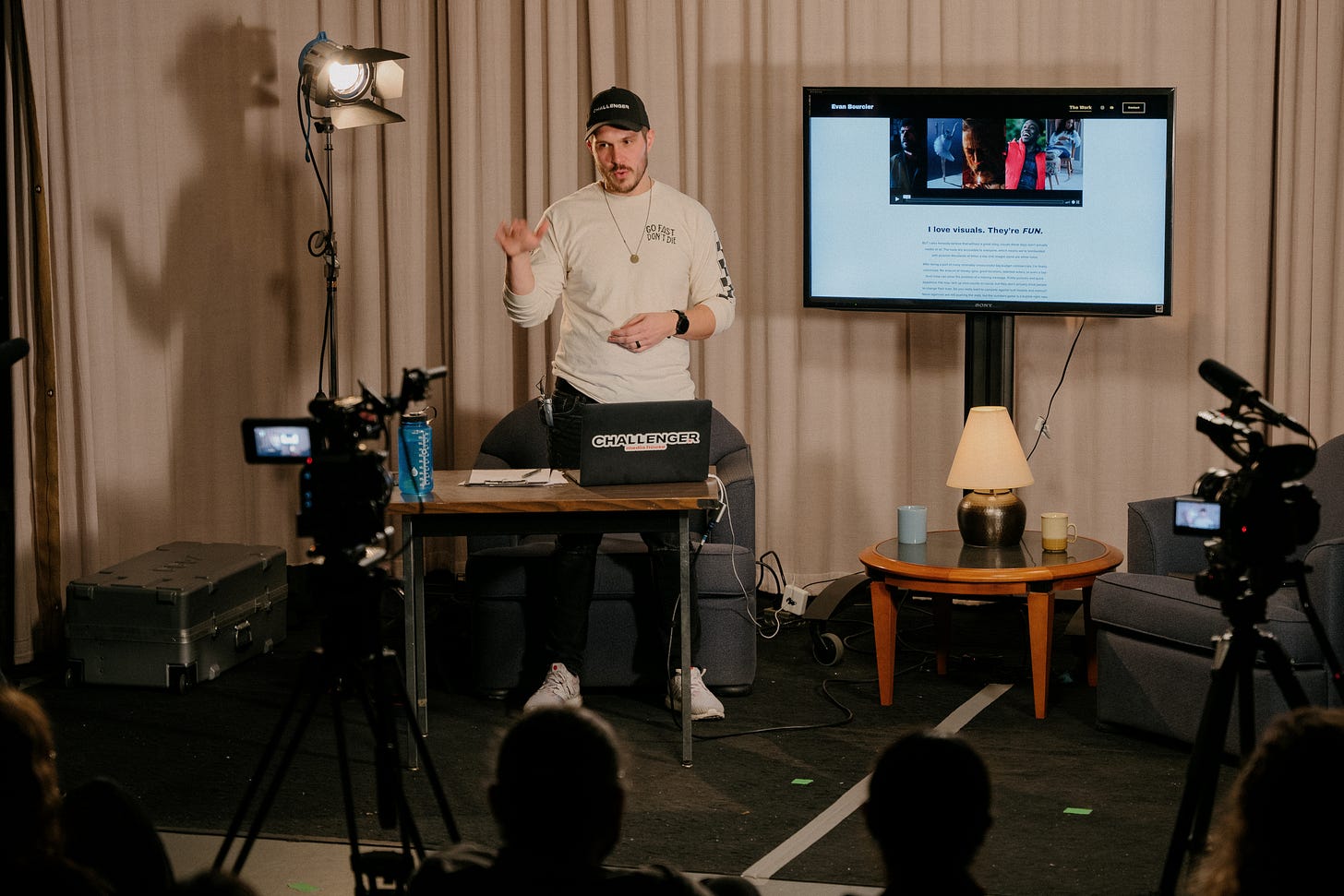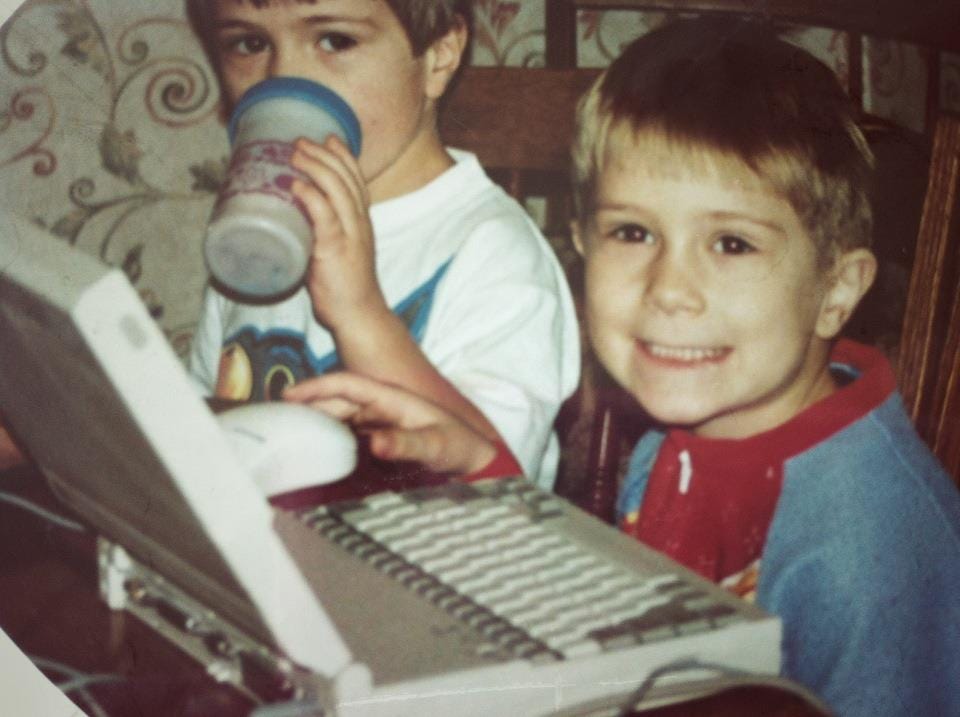When More is Not Better.
As a child I never dreamed of maximized economic leverage, and I don’t care to start now.
Good afternoon! I’m glad you’re here for my first ever substack post! I wanna get right into it - I’ll introduce myself next time, I promise.
If you’d like a richer experience, this is the playlist I was listening to while writing.
Let’s begin.
My old buddy PJ shared a crazy new video from Google’s VEO AI, which immediately went viral and it brought up a lot of reflections for me.
Let’s take a look at this glorious post.
Link to the tweet/video: https://x.com/PJaccetturo/status/1925464847900352590
Side note: I’m very unclear in what world I’d want to “steal” the word-salad that produced this Kardashian show Pharma-ad hallucination, but that’s beside the point.
I’d love to hear what came up for you watching that video.
For me, I find the whole thing quite odd, mainly in this weird way that we’re framing things on short form media, and what that reveals about how we view the world and our place in it.
“I used to do X (impressive), today I did Y (easy), why do X anymore?”
It would be weird for an NFL player to go “I used to play this sport in front of millions of people, but now I can play it on my phone. Why bother playing sports anymore?”
You could easily flip the original caption to “Today I made this with $500 in AI tokens, but some day I’m going to direct $500k commercials in real life!” that flips the implicit values inside the statement, and I’d like to go down a rabbit hole on implicit values, economic leverage, and creativity for human beings.
Before entering the rabbit hole together, I’d love to offer a palette cleanser:
“There is no greater illusion than fear, no greater wrong than preparing to defend yourself, no greater misfortune than having an enemy. Whoever can see through all fear will always be safe.” - Lao Tzu
I don’t expect to “fix” an internet culture which LOVES fear, defensiveness, and making enemies, but I do see an opportunity to do my part and share a different perspective.
First, let’s talk about the “commercial” itself.
To me it vaguely resembles a $500k commercial, but it’s qualitatively different. It’s like a wax-museum fever dream. Taking that example and comparing it to top-tier filmmaking is like holding up a RealDoll™ (Don’t google it) and saying “What’s the argument for having a partner?”
Well honey, I’m sure someone will love it, but it’s missing something.
It looks like a duck and quacks like a duck, but is not a duck.
It’s very Dr Frankenstein’s-monster… in more ways than one.
My intent is not to bash technology or people, but to open up a dialogue about what we value and where we’re going. I hope that we can get past the Mexican stand-off that so often happens in polarized conversations about the merits and dangers of new technology, and move forward together into mutual human flourishing.
I will also briefly call out my bias - I am a 31 year old professional storyteller who has spent most of my adult life traveling the world crafting and sharing human stories, mostly through video. I love video. I love stories. I love PEOPLE. My bias is that I love the process of making these things - just as much as I like having them.
Now an important point here is that I am no luddite - I have embraced technological advancement as long as I have been alive. Cameras, phones, lenses, lighting, software… Gosh I’m glad we’re not physically cutting tape anymore. Innovation is great.
BUT: I’ve been feeling something for the last few years quietly creeping up in my life - this tendency for things to feel thinner, more manipulative, like a front. Somehow we’re “innovating” and everything feels worse.
You know when you walk into a restaurant that feels both half-baked and overpriced, the customer service sucks, and you feel like it’s just an excuse to take your money?
Most things feel that way to me lately.
Extract too much without giving back and things fall apart fast - just look at what’s happening with out farm land and food.
When I was growing up, Panera was great. When I was 18 working at Marshalls Panera was my go-to lunch spot, hitting the sweet spot of price, portions, feeling nutritious, and being tasty.
In 2017 it got bought by private equity, and as far as I can tell their strategy was to lower costs and raise prices - basic business, right? On some level… yes. BUT: $30 hospital food is no longer a product that serves me, and I no longer shop there.
We keep aiming to ratchet up prices and lower costs, and in the process many experiences are getting worse… except that someone is generating outsized financial leverage.
Back when I was still an 18 year old Panera fan, I quit my minimum-wage retail job to jump into full-time creative work. I have been an entrepreneur every day of my life since then.
I am not anti-capitalist (per-se), anti-business, or anti-abundance.
I’m actually hugely hopeful that over the rest of my life we will see more and more humans experiencing freedom, abundance, and their creative magic every day of their life.
To get anywhere close to that world: we need to acknowledge the elephant in the room.
We bought the idea that business is primarily about making money.
I could NOT disagree more.
Businesses are here to help people and have fun.
The money is just how we make sure it’s sustainable.
If we’re not helping people and having fun, what’s the point?
For me, business has always been about creating great experiences.
Business has always been about community.
Business has always been about the power of cooperation and collaboration.
Business has always been about the pursuit of excellence.
Business has always been an opportunity to take the load off someone else.
Business has always been about the ability to bless others with our gifts.
Business has always been a vehicle for service, beauty, and generosity.
Business has always started with giving.
Any financial return is just quiet applause for a job well done.
One of my missions is to help equip people with courage and education to create a life they love, in a community they love, in a world they love.
This is a world where each defines their own success based not just on societally endorsed achievements, but on the fulfillment of their soul. A world where we realize more is not always better, and better doesn’t always require more. This is honestly the core of the conversation - the age-old intersection of quality and quantity, but more importantly of the way we interact with each other and the legacy we leave behind.
For the sake of the conversation I’m going to assume PJ (like many others) sees video as something akin to a tool used to create economic leverage.
It is a tool. An instrument. A means to an end.
This is a very common perspective. It is a quantitative perspective, focused on measuring more-ness.
From this perspective it is a simple problem with one answer: IF your prime motivating factor is economic leverage then yes, this technology indeed kills your motivation to make a real video.
Imagine: Just type a few words and BLAM, money direct-deposited into your account. None of that pesky writing, casting, designing, strategizing, collaborating, shooting, laughing, crying, new friends, new experiences, memories…
We can cut all that shit out and skip right to the paycheck part.
Honestly. I get it. I’ve been there. It feels like it makes sense…
But we weren’t born seeing the world like that.
“At a party given by a billionaire on Shelter Island, Kurt Vonnegut informs his pal, Joseph Heller, that their host, a hedge fund manager, had made more money in a single day than Heller had earned from his wildly popular novel Catch-22 over its whole history. Heller responds, “Yes, but I have something he will never have… enough.” Enough. I was stunned by the simple eloquence of that word—stunned for two reasons: first, because I have been given so much in my own life and, second, because Joseph Heller couldn’t have been more accurate. For a critical element of our society, including many of the wealthiest and most powerful among us, there seems to be no limit today on what enough entails.” - Morgan Housel
As a child I never dreamed of maximized economic leverage, and I don’t care to start now. I find enough to be a much more fulfilling place to live.
I did dream of being in movies, I dreamt of making music, I dreamt of writing books, I dreamt of flying planes…
Thankfully, many of those dreams have come true.
My imagination was calling me to adventures, experiences, and relationships, and honestly if I just wanted to fantasize… Dreaming is free.
You don’t need AI to imagine. You just need to remember it’s an option.
Again: this is not about AI or money being good or bad. It’s about how we use it.
The only reason that kid would want a “ton of money” is really to facilitate those experiences, take care of his physical needs, and support the people around him.
Over time those goals would be accomplished and new bigger ones may come along, but it’d always involve our trifecta of money, help, and satisfaction.
Now the minute we talk about ethics, morals, and beauty some will cry “virtue signaling” or “moral superiority” which is not my intent. The stark reality is that a massive chunk of our nation and the world is still struggling to make ends meet, and it can feel privileged to talk about values during such a tumultuous time.
But this is exactly why these conversations must be had. We got ourselves into this mess. We built a game which is not serving us, and the only one who can build a better system is us.
One of the biggest lessons we need to re-learn is how to design systems that care for the generation after we are gone, rather than leaving them holding the tab. It’s hard when everything goes so fast - we’re so caught up in the swing that “what are the implications 50 years from now” is hard to imagine, but worth considering.
I hope we can realize that much like AI prompts - the words, implicit values, and attitudes that we bring to our own expression of life changes the output we experience.
Say I set a new goal today: “I’m going to make the most profitable pizza restaurant in CT. We’re going to create a brand (Using AI) that screams high-end so we can justify charging $40 for a pie, and we’re going to source the cheapest ingredients to really focus on margin.”
VS
“I’m going to make the best pizza restaurant in CT. A place that brightens people’s days, nourishes their body, and connects them with other passionate people to live life together. It’ll be a place that people WANT to work. A place where the culture is supportive, the hours are reasonable, communication is clear, and we all take care of each other. I’m confident that if we run this well and serve people consistently, there’s plenty of resources to build this, pay our people - and myself - well.”
I can tell you which world I want to live in, and that is the world I would like to invest in.
”We must play. But our merriment must be of that kind (and it is, in fact, the merriest kind) which exists between people who have, from the outset, taken each other seriously-no flippancy, no superiority, no presumption.” - C.S. Lewis
Let’s talk a little bit about investing.
Imagine for a moment that we’re a hunter-gatherer community, and this summer we really crush it as a team. We have more than we need, and we’re able to take some time off from the hunt.
Enjoying that rest is great, AND we can use that extra time to build some new spaces in our village. We add a playground, a building for storing excess food, and a grand hall where we can all dance together when the sun goes down.
Our goal would be to make these things as good as we could, for the people around us.
Note that none of these investments are focused on improving the efficiency of the hunt.
Those innovations would be happening as well, and their main purpose would be to allow us to have even more time in the village with our family and friends, building things we love, telling stories, making art…
Living out real human experiences.
We “work” to come back to play.
To build healthy communities.
To provide for and enjoy our bodies.
To relate, to explore, to enjoy each other and the fruits of our labors.
The point of the hunters and gatherers was to give to the community, and take care of the people who were not hunting and gathering. In response, the community took care of them.
It was never to stockpile as much as possible for themselves.
It was never to pile up insane amounts of food and then watch it rot, bragging about your returns while the community starved.
So then the question becomes, who is your community?
Who do you serve?
What does this have to do with AI videos?
Well, we’re talking about what we do and why. We have options here - real production vs machine generated imagery, and the question of costs.
Let’s start with costs.
I will be the first to admit that video production is not cheap. It is in many ways an apex art - operating at the intersection of writing, undercover journalism, theater, sound design, and pretty much every other art that came before it.
That is not to say that it is superior.. It’s just the most complex, which is part of why it’s the most powerful tool we have. Part of the power is that it is real, it requires a lot of incredibly skilled people to do well, and that it is expensive.
The picture above is from a project my company Challenger Media House did with Johnson and Johnson, which involved sharing the story of ESPN anchor Mike Greenberg’s journey with heart arrhythmia.
It was everything I love about filmmaking. Real experiences, a team coming together to approach a powerful story with reverence. Our budget was $45,000.
The alternative quote the client had received from a large agency was $220,000.
Production budgets are another story for another day - but our team was able to execute on all the core values of the project, pay the crew their requested rates, give them a reasonable schedule with a 5 hour day, and we captured all 20+ short form content clips for the campaign along with the main story.
So quick aside: If you’re sitting there debating whether to spend $500k… Let’s talk. I’d love to help you maximize the actual impact of your investment.
If we suddenly saved $499,500 on “marketing” what would we use it on? Throwing a company party? Providing stronger benefits to our employees? Lowering our prices? Training employees? Developing a new offering?
I’m not one to judge how anyone spends their money - but the trend across our economy has been that the money doesn’t get re-invested, it goes to the bottom line.
I’d personally love to see a company that replaces employees in tedious positions with AI but keeps them on payroll.
But the attitude at large is that if they can be replaced, they should. More for me!
AI AXIOM 1: "Anything which can be cut shall, including having ChatGPT summarize movies and music for me so I don’t have to “waste time or resources” experiencing them.”
I must ask: What is the argument for relationships from this perspective? I’m assuming it’d be about shared costs, tax benefits, shared entrepreneurial networks, and greater opportunity.
I’m very curious if we’ll move to an AI-generated partner who legally provides the same benefits, without any of that pesky listening to how their day went, learning about things they care about, or generally being in the way of my potential economic greatness.
It’s very means-to-an-end. But the critical fallacy in all these perspectives is that they fail to acknowledge the lack of an ending worth looking forward to.
What’s the village look like when we finish hunting and gathering?
Is there even a village anymore?
Or did we price everyone out?
Again, this isn’t about technology - it’s about the worldview of the person using it.
The whole social media scene gives me very “pick-up-artist” vibes. These are the guys who preach “If you just say the right thing girls will sleep with you and you don’t even have to care about them.”
Yuck. It feels oddly similar to some comments I’ve heard in board rooms about stupid customers though. If you hold that position, eventually you get a bad reputation and you have to re-earn trust, or get Luigi Mangioni’d (allegedly).
I’d personally rather keep the trust from the beginning.
The Irish philosopher John O’Donohue had a concept he called the “reverence of approach.” He said, “When we approach things with reverence, great things decide to approach us.”
May we approach our business endeavors, customers, and employees with reverence.
I do want to briefly imagine this future…
I’m gonna assume we’re all adults here. (If you’re not, that is totally ok)
I could just buy a sex toy.
Get a cheap apartment.
Put on my oculus.
Ask the AI to tell me it loves me.
Ask it to optimize my leverage in the world.
Ask it to order me delivery food so I don’t have to leave my pod.
Ask it to make friends for me so I don’t have to waste time.
To be clear: I’m saying have it literally make friends for me, not to find friends. Can’t risk them having a different perspective than me.
That should satisfy that inefficient social itch.
Ask it to optimize my diet for maximal nutrient density at a minimum cost.
Oh and definitely have it write a script that identifies and removes all ads from my experience.
I could have it make me a virtual mansion, where I don’t have to cook or clean or take care of anything, or hire anyone else to.
All this economic efficiency will allow me to focus my attention on finding more opportunities to avoid focusing on anything in the long run.
Then I can sit alone in my virtual mansion watching the number on my virtual bank account balance go up.
Maybe if I do end up making real money I can go on a trip to Bali, but honestly, why bother with the inefficiency of travel when I could just go in VR and hang out with my fellow vibe-coders, all connecting on how we have no shared experiences because we exclusively consume personalized AI-generated stories, and haven’t learned anything lately because the AI runs our systems for us.
As a quick aside - I find the optimism about AI unlocking UBI (Universal Basic Income) a bit confusing, as our companies have been making trillions of dollars of profit for a LONG time and they have not offered to pass that benefit back to the people. I’m not sure how AI would change that, but time well tell.
Back to my imaginary life - maybe I should send an AI-Agent to the virtual hangout in Bali so I don’t have to waste time which could be spent making money.
I digress, and confess that this line of reasoning frustrates me. Let’s wrap it up.
My playstation has been able to simulate football seasons for most of my life.
I still play football, despite it being more expensive, messier, takes longer, I gotta get people together… Because I find the experience more compelling than having a computer tell me who won.
I still watch football. I find the connection with others - whether the players or the people watching - to be valuable and add meaning to my life. It’s a fun opportunity to connect with someone on the street and jam to a stranger about how last night’s playoff hockey game went.
I show up on social media not just for mindless entertainment, but to see how my community is doing - to support and encourage artists, entrepreneurs, athletes, parents… I don’t want more ads or AI generated content - I want more of my village. I want a deeper connection. I want to support and be supported. I want real stories.
If the internet continues to be overrun by AI, I’d personally rather go back to in person book clubs reading great works by great minds, and continue chipping away at my progress and mastery of my craft. I want to experience mastery, connection, and exploration for REAL.
Otherwise, I would just go slap my name on the Mona Lisa, photoshop myself onto Mount Everest, blast it all over social media with a viral hook, and call it a day. I would have ACHIEVED!
This kid loves computers almost as much as he loves people.
In my 13 years of professional helping organizations tell stories with impact, I have toured hundreds of organizations, interviewed thousands of individuals, and I have learned so much.
Never once have I had a great experience and thought “Wow this is economically unnecessary, wait until they realize you don’t need to make buildings beautiful, you don’t have to be kind to people, food doesn’t need to be delicious, you don’t have to drive to another town and hang out in a crowded room to listen to your favorite band…”
I have never once thought “Man if they just cut some corners this thing could make more money.”
For what?
The ONLY point of money is taking care of yourself and each other.
Taking care of your body.
Training your mind
Exploring the world.
Engaging in group and solo activities.
Building communities.
Building connections.
I cannot control the world, but I can personally invest in companies and individuals investing in making the human experience a deeper and more beautiful one.
I have seen rising tides raise all ships.
I am ready to join the tide for the sake of our ships.
Will you join me?
May we experience abundance. Not just personally, but collectively.
May our employees make more than we imagined.
May we stay up late dying laughing with our friends.
May we make movies that we love, telling stories that’ve lived, to share with people we care about.
Because Life is bigger than economic leverage.
We’re here for the Challenge of living harmoniously together.
Not creating power over each other, but power together.
Long Live the Dream.
Thank you for reading. I’m sure I missed something, said something wrong, and there’s a chance I’m a blithering idiot - if anything resonated with you or you have anything to add I’d love to hear it. You can leave a comment here or DM me on instagram @ebourcier. I can’t wait to hear from you.




